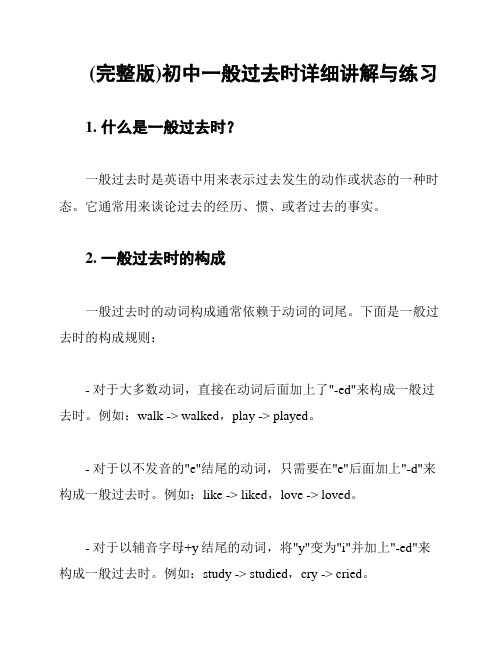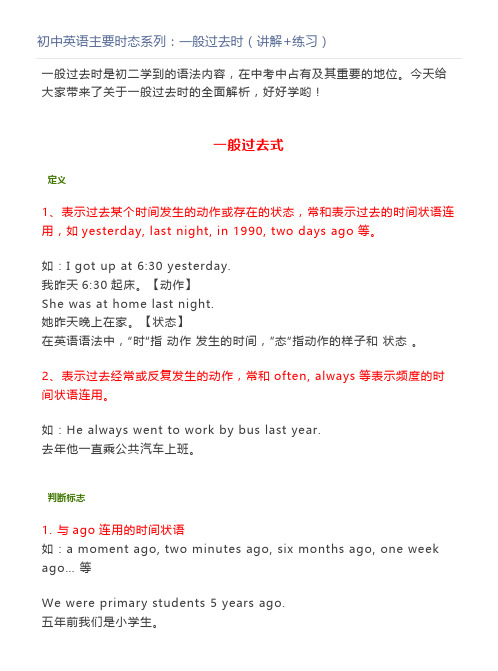初中一般过去时
初中英语一般过去时总结(28张)

第二部分 一般过去时的构成
7
Language points
二、一般过去时的构成 1.be动词在一般过去时中的变化: (1)am和is在一般过去时中变为______. 用于第________人称单数。 例如: 我九岁。 ___________________________________________. 我去年九岁。 ____________________________________________.
Homework
6. They _____ (make) a lot of toy planes last Tuesday. 7.1 _____ (fly) a kite with my brother in the park yesterday. 8. The mouse _____ (bite) the net and got out.
过去式 sat
swam drew sang could slept met read
Language points
动词原形 teach say begin give drink let spend
过去式 taught
said began gave drank
let spent
动词原形 ride run buy keep drive mean bring
一般过去时
contents
1 一般过去时的概念及用法
2 一般过去时的构成
3 动般过去时的概念及用法
3
Language points
一、一般过去时的概念及作用
1.一般过去时表示过去某个时间发生的动作或存在的状态,常和表示过 去的时间状语连用。 例如: My mother's handbag was on the sofa just now. We went to the farm last week.
(完整版)初中一般过去时详细讲解与练习

(完整版)初中一般过去时详细讲解与练习1. 什么是一般过去时?一般过去时是英语中用来表示过去发生的动作或状态的一种时态。
它通常用来谈论过去的经历、惯、或者过去的事实。
2. 一般过去时的构成一般过去时的动词构成通常依赖于动词的词尾。
下面是一般过去时的构成规则:- 对于大多数动词,直接在动词后面加上了"-ed"来构成一般过去时。
例如:walk -> walked,play -> played。
- 对于以不发音的"e"结尾的动词,只需要在"e"后面加上"-d"来构成一般过去时。
例如:like -> liked,love -> loved。
- 对于以辅音字母+y结尾的动词,将"y"变为"i"并加上"-ed"来构成一般过去时。
例如:study -> studied,cry -> cried。
- 部分动词的一般过去时需要进行不规则变化。
例如:go -> went,eat -> ate。
3. 一般过去时的用法一般过去时通常用来描述以下情况:- 过去发生的动作:I walked to school yesterday.- 过去的经历:He lived in London for five years.- 过去的事实:She was a teacher in the past.4. 一般过去时的句型练下面是一些练,帮助加深对一般过去时的理解和运用:1. 请用一般过去时填空:Yesterday, I ________ (watch) a movie at home.2. 完成句子:He _____ (visit) his grandparents last summer.3. 改写句子,使用一般过去时:I read a book yesterday. (改为否定句)4. 改写句子,使用一般过去时:They played basketball in the park. (改为疑问句)5. 总结一般过去时是用来表示过去发生的动作或状态的一种时态。
突破初中语法:一般过去时(附中考真题及解析)

一般过去时01一般过去时的概念一般过去时用来表示过去某一时间内发生的动作或存在的状态以及过去习惯性、反复性的动作。
谓语动词要用动词的过去式,常和表示过去的时间状语连用,如y e s t e r d a y昨天、l a s t n i g h t昨晚、l a s t w e e k上周、l a s t y e a r去年、…a g o等。
02一般过去时结构⒈Be 动词的一般过去时在没有实义动词的句子中使用be 动词am is 的过去式为was,are 的过去式为were,was 是表示单数,were 是表示复数。
肯定句式:主语+be(was,were)其它否定句式:主语+be(was,were)+not其它一般疑问句:Be(was,were)主语+其它?⒉实义动词的一般过去时态肯定句要使用动词的过去式,否定句和疑问句要使用助动词did.肯定句式:主语+动词(过去式)+其它否定句式:主语+didn't+动词(原形)+其它(did not=didn't)一般疑问句:Did+主语+动词(原形)+其它(do,does的过去时均为did)注:did 和didn't 是构成一般过去时的助动词,其特点是要在其后跟动词的原形。
03 规则动词的过去式⒈一般情况下,在动词原形后面加-ed如:looked,played,started,visited,stayed⒉以不发音e结尾的动词,在词尾直接加-d如:lived,closed,liked,loved,tasted⒊以“辅音字母+y”结尾的动词,先将y改为i再加-ed如:study→studied,try→tried,cry-→cried,copy→copied,carry-→carried⒋以重读闭音节(即辅音+元音+辅音)或r音节结尾,未尾只有一个辅音字母的动词,要先双写这个辅音字母后,再加-ed如:stop→stopped,plan→planned04不规则动词的过去式一、AAA型(原形→原形→原形)二、ABA型(原形→过去式→原形)三、ABC型1. ow →ew →own2. i→a →u3. 原形→过去式→过去式+(e)n4. 原形→过去式→原形+(e)n5. 无规律四、ABB型1. 原形→ought →ought2. 原形→aught →aught3. 变其中一个元音字母4. 原形→□t→□t5. 变其中一个辅音字母6.辅音字母和元音字母都变五、AAB型六、有两种形式七、情态动词05 一般过去时的用法⒈表示过去某个特定时间发生的动作或存在的状态常有明确的时间状语,如yesterday,last night,some years ago,in 1890 等,以及由when 等引导的时间状语从句。
初中英语主要时态系列:一般过去时(讲解+练习)

初中英语主要时态系列:一般过去时(讲解+练习)一般过去时是初二学到的语法内容,在中考中占有及其重要的地位。
今天给大家带来了关于一般过去时的全面解析,好好学哟!一般过去式定义1、表示过去某个时间发生的动作或存在的状态,常和表示过去的时间状语连用,如yesterday, last night, in 1990, two days ago等。
如:I got up at 6:30 yesterday.我昨天6:30起床。
【动作】She was at home last night.她昨天晚上在家。
【状态】在英语语法中,“时“指动作发生的时间,”态“指动作的样子和状态。
2、表示过去经常或反复发生的动作,常和often, always等表示频度的时间状语连用。
如:He always went to work by bus last year.去年他一直乘公共汽车上班。
判断标志1. 与ago连用的时间状语如:a moment ago, two minutes ago, six months ago, one week ago… 等We were primary students 5 years ago.五年前我们是小学生。
2. 与last 连用的时间状语last week, last year, last month, last day…He suddenly fell ill last night.他昨晚突然病倒了。
3. 与 yesterday 连用的时间状语yesterday morning, yesterday morning …We weren\'t late yesterday. 我们昨天没迟到.※the day befo re yesterday 昨天4. 与 one 连用的时间状语one morning 某个早上, one evening 某个夜晚5. 与that连用的时间状语that day, that morning, that year…6. 其他时间状语just now 刚刚 in the old days 在过去in 1980 at that time在那时构成含有be动词的一般过去时的主结构:主语+was/were+表语1、肯定句:主语+was/were+表语。
初中英语七年级一般过去时讲解

初一一般过去时讲解一般过去时:一、一般过去时的构成:主语+谓语(动词过去式)+句子其他成分;主语+was/were+形容词/名词/介词短语+过去时间;否定形式①was/were+not;①在行为动词前加didn't,同时还原行为动词;一般疑问句Did+主语+do+其他注意:这里的-ing形式叫做现在分词二、一般过去时句型变化:1、肯定式:主语+谓语(动词过去式)+句子其他成分;主语+was/were+形容词/名词/介词短语+过去时间如:They played computer games together. 他们一起打游戏来着。
I was happy when last week. 上周我很开心。
2、否定式:否定形式①was/were+not;②在行为动词前加didn't,同时还原行为动词;如:They weren't in Paris last year. 他们去年不在巴黎。
I didn’t know that. 我不知道那件事。
3、一般疑问句Did+主语+do+其他。
如:Did you do your homework? 你做作业了吗?4、特殊疑问句式:特殊疑问句结构:特殊疑问词+一般疑问句?现在进行时的特殊疑问句结构:①特殊疑问词+did+主语+do(+其他成分)?②特殊疑问词+was/were+主语+do(+其他成分)?eg:1、What did you do?你们干什么来着?We played basketball.我们打篮球来着。
2、Where were your parents last year?你父母去年在哪里?They were in Tokyo.他们在东京。
注1:1、be动词在现在进行时里算作“助动词”,翻译现在进行时的时候,be不能解释为“是”,否则不通顺。
它只是和现在分词搭配构成“进行时”。
2、变一般疑问句时,形成“一问一答”的关系,要注意第一人称和第二人称相互交换。
初中英语语法一般过去时及练习题

初中英语语法一般过去时及练习题般过去时的用法般过去时表示过去某个时间发生的动作或存在的状。
常和表示过去的时间状语连用。
如:last year, terday等;也可表示过去经常反复发生的动作,常often, always等频率副词连用。
如:I saw him in the street yesterday. 昨天我在上看见他了。
Mei always went to school on foot last year. 去李梅总是步行上学。
意:也可以用“used to +动词原形”表示过去经常或复的动作。
We used to get up early. 我以前总是早起。
(意现在不早起了)一般过去时的形式:词be: 第一人称单数和第三人称单数用was, 其余的称一律用were。
词have: 一律用had, 没有人称和数的变化。
为动词:一律用过去式,没有人称和数的变化,行为词的过去式有两类,一类是规则动词,另一类是不规动词。
般过去时动词的肯定、否定、一般疑问句和简略回答及特殊疑问句的形式见列表:定、否定形式为动词的过去时的否定式,要使用助动词 do 的过去did,后面的谓语动词要还原为原形。
注意:在非正语如口语中,was not, were not, had not和did not 以分别缩写成wasn’t, weren’t, hadn’t和n’t。
般疑问句和简略回答殊疑问句和简略回答一般过去时的几种句型(这里只讲行为动词)肯定句结构为:主语+动词的过去式+其他。
如:He t to the toy store yesterday. 他昨天去玩具店了。
否定句结构为:主语+di d not (didn’t)+动词原形他。
如:He didn’t go to the toy store yesterday. 昨天没去玩具店。
一般疑问句的构成:Did+主语+动词原形+其他?:1) -Did you go to Beijing last week?-Yes, we did. (No, we didn't.)2) -Did you meet the businessman before?-No, I didn't. (Yes, I did.)特殊疑问句的构成:疑问词+did+主语+动词原形其他?如:1) -What did you do last night?-I did my homework.2) -Where did you go last week?-I went to Shanghai with my parents.一般过去时口诀一般过去时并不难,表示过去动作、状态记心间。
初中英语知识点总结一般过去时
初中英语知识点总结一般过去时一、一般过去时的用法:一般过去时表示过去发生或完成的动作、存在的状态或做过的事情。
1.表示过去一些时间发生的动作或存在的状态:- I played soccer yesterday.(我昨天踢足球。
)- He lived in Beijing when he was young.(他年轻时住在北京。
)2.表示过去的习惯性动作或经常发生的动作:- When I was a child, I always went to bed early.(我小的时候总是早睡。
)3.表示过去的客观事实或真理:- The dinosaurs died out millions of years ago.(恐龙在几百万年前灭绝了。
)- She didn't know the answer to the question.(她不知道问题的答案。
)4.表示过去的心理活动、愿望或打算等:- I wanted to be a doctor when I was young.(我年轻时想做一名医生。
)- He hoped to go to the park with his friends.(他希望和朋友去公园。
)二、一般过去时的构成:1.肯定句式:主语+动词的过去式+其他成分- I played basketball last week.- She lived in London for three years.- They watched a movie at the cinema yesterday.2.否定句式:主语 + did not / didn't + 动词原形 + 其他成分- I didn't play basketball last week.- She didn't live in London for three years.- They didn't watch a movie at the cinema yesterday.3.疑问句式:Did + 主语 + 动词原形 + 其他成分?- Did you play basketball last week?- Did she live in London for three years?- Did they watch a movie at the cinema yesterday?三、一般过去时的特殊情况:1.动词过去式的构成规则:a) 一般情况下,动词的过去式在词尾加上-ed:walk - walked(走)talk - talked(说话)play - played(玩)b)以字母e结尾的动词,在词尾只加-d:dance - danced(跳舞)c) 以辅音字母+y结尾的动词,将y变为i,再加-ed:study - studied(学习)d) 以重读闭音节结尾,末尾只有一个辅音字母的动词,双写这个辅音字母,再加-ed:stop - stopped(停止)plan - planned(计划)2.部分动词的过去式不规则,需要记忆:be - was / were(是)have - had(有)go - went(去)do - did(做)write - wrote(写)see - saw(看见)eat - ate(吃)drink - drank(喝)take - took(拿)四、表示一般过去时的时间状语:1.表示过去一些时间的状语:yesterday(昨天)last week(上星期)two days ago(两天前)2.表示过去的时间段的状语:when I was young(我年轻时)in my childhood(在我童年时)in the past(在过去)3.表示过去曾经做过的动作的状语:once(一次)五、注意事项:1. 一般过去时的句子中,谓语动词要用过去式,但be动词有时会用was或were。
初中一般过去时--精讲
他每天都吃水果。
He __h_as__ fruit every day.
昨天他吃了3个苹果。
He _h_a_d__ 3 apples yesterday.
have/ has
had
go
ቤተ መጻሕፍቲ ባይዱwent
use
think thought live
be
was/ were wake
happen happened keep
give gave
say
become became clean
get got
buy
rain rained play
stay stayed learn
pass passed see
She _d_id_n_’t__pl_a_y_ basketball after school yesterday.
Do you go to school on foot every day? _D_id_ you _g_o to school on foot yesterday.
Does he go to school by bus every day?
stop stopped finish finished
三、一般过去时基本用法
1.表示在过去时间里发生的动作或存在的状态
Liu Jie got up at 7: 10 this morning. He was a student three years ago. 2.表示过去经常或反复发生的动作。 Zhang Yuan always went to school by bike last year. 3.表示已故人所做的事情。
初中英语一般过去时详解及练习题
一般过去时1.一般过去时表示在过去某一时间发生的动作或存在的状态表示时间的词有:yesterday,this morning/afternoon/evening,last+时间(上个...)last night,last Sunday,last week,last year2.一般过去时的基本结构肯定句式①主语+was/were+其他例句:He was here yesterday.②主语+动词过去式+其他例句:I went to play basketball last Sunday.否定句式①主语+was/were+not+其他例句:She wasn’t at home this morning.②主语+didn’t+动词原形+其他例句:I didn’t find you yesterday..一般疑问句①Was/Were+主语+其他例句:Were you at school last week?②Did+主语+动词原形+其他例句:Did you play football yesterday?特殊疑问句特殊疑问词(如what,why,when,where等)+一般疑问句句式例句:Where were you yesterday?What did you do yesterday?3.动词的过去式规则动词①一般情况下直接在动词后+ed例:work-worked look-looked walk-walked②以e结尾的单词直接+d例:live-lived hope-hoped use-used③以辅音字母+y结尾的,改y为i再+ed例:study-studied carry-carried以元音字母+y,直接+ed例:enjoy-enjoyed play-played⑤以重读、一个辅音字母结尾的闭音节结尾的动词,双写最后的辅音字母+ed例:stop-stopped plan-planned prefer-preferred不规则动词(书本76页表格)动词原形过去式动词原形过去式is/am was do didare were get gotbegin began go wentbuy bought have hadcome came make maderead read see sawrun ran take tookeat ate一般过去时练习题一、写出下列动词的过去式1.is/am_____2.fly_____3.plant_____4.are_____5.drink_____6.play_____7.go_____8.make_____9.do_____10.dance_____11.worry_____12.ask_____13.eat_____14.pass_____二、用所给动词的适当形式填空1.He_____(be)at home last night.2.He_____(visit)the Great Wall last year.3.We_____(have)a good time yesterday.4.We_____(go)to school by bus last year.5.Sam_____(did)the housework yesterday.6._____(do)you______(play)the violin this morning?三、选择题1.The two girls____all in Class1last year.A.areB.wasC.were.D is2.This morning he____a taxi.A.tookB.takesC.take.D is taking3.I_____to school at8o’clock yesterday.A.goB.am goingC.went D goes4.-What did you do last night?-I______a story bookA.readB.readedC.am reading D reads。
初中英语知识点一般过去时
初中英语知识点一般过去时一般过去时是表示过去某个时间或者某个时间段内发生的动作或者状态的时态。
在句子中,一般过去时通常使用动词的过去式。
1. 一般过去时的构成动词的过去式通常是在动词原形后面加上-ed。
但是也有一些不规则动词的过去式需要特别记忆。
例如:- play →played- study →studied- go →went- eat →ate- see →saw2. 一般过去时的用法(1)表示过去某个时间或者某个时间段内发生的动作或者状态。
例如:- I watched a movie yesterday.(我昨天看了一部电影。
)- She lived in New York for three years.(她在纽约住了三年。
)(2)表示过去的习惯或者经常性的动作。
例如:- When I was young, I played soccer every day.(我小时候每天都踢足球。
)- He always ate breakfast at 7:00 am.(他总是在早上7点吃早餐。
)(3)表示过去的真实条件。
例如:- If it rained, we stayed inside.(如果下雨了,我们就呆在屋里。
)(4)表示过去的虚拟条件。
例如:- If I had more money, I would buy a new car.(如果我有更多的钱,我会买一辆新车。
)3. 一般过去时的时间状语一般过去时常常和表示过去时间的时间状语连用,例如:- yesterday(昨天)- last week(上周)- two years ago(两年前)- in 1999(在1999年)- at that time(那个时候)以上就是初中英语知识点:一般过去时的介绍。
希望对大家有所帮助。
- 1、下载文档前请自行甄别文档内容的完整性,平台不提供额外的编辑、内容补充、找答案等附加服务。
- 2、"仅部分预览"的文档,不可在线预览部分如存在完整性等问题,可反馈申请退款(可完整预览的文档不适用该条件!)。
- 3、如文档侵犯您的权益,请联系客服反馈,我们会尽快为您处理(人工客服工作时间:9:00-18:30)。
last night
in 1990 two days ago 等
巧记时态 返回首页
什么是一般过去时?
动词的一般过去时态表示过去发生的 动作、情况或存在的状态。也表示过去 经常或反复发生的动作。
行为动词(即实义动词)的过去式没有 人称和数的变化。
所有时态都是通过
动词
变化来表现的
谓语构成
1.动词 be
字母,再加ed . 如:stop→stopped plan(计划) →planned
drop -- dropped beg -- begged 4、以“辅音字母+y”结尾,y改为i, 再加 -ed。
carry -- carried study -- studied hurry -- hurried 5.不规则变化.(见不规则动词表P148)
3、在 / t, d / 音后面, 读 / id / 。 wanted / tid / needed / did /
finished /t/ enjoyed /d/ shouted /Id/ moved /d/
helped /t/ wanted /Id/ called /d/ needed /Id/
She _d_id_n_’t__pl_a_y_ basketball after school yesterday.
Do you go to school on foot every day? _D_id_ you _g_o to school on foot yesterday.
Does he go to school by bus every day?
初中一般过去时
一般过去时态(The Simple Past Tense)介绍
1.定义: 一般过去时态表示过去某个时间发生的动作或 存在的状态,常和表示过去的时间状语连用;也表示 过去经常或反复发生的动作,常和表示频度的时间状 语连用。
2.谓语动词变化:1.be 动词 2. 行为动词(实义动词)
3.时间状语: yesterday
am, is -- was are -- were do -- did go -- went have -- had see -- saw can -- could may -- might dig -- dug eat -- ate find -- found make -- made hear -- heard run -- ran take -- took hold -- held speak -- spoke leave -- left
_D_id_ he _g_o_to school by bus yesterday?
don’t/ doesn’t
didn’t
do/ does
did
一般过去时的谓语构成:由动词 的过去式构成
规则变化
1.一般加ed work — worked 2.以e结尾加d change — changed
3.末尾只有一个辅音字母的重读闭 音节词,先双写这个辅音字母,再 加ed . stop — stopped
他们今天在中国。 They _a_r_e_ in China today.
他们昨天在日本。 They _w_e_re_ in Japan yesterday.
am/ is are
was were
每天,早餐我吃鸡蛋和牛奶。 I h_a_v_e_ eggs and milk for breakfast every morning.
昨天,早餐我吃面条。 I _h_a_d_ noodles for breakfast yesterday morning.
他每天都吃水果。
He __h_as__ fruit every day.
昨天他吃了3个苹果。
He _h_a_d__ 3 apples yesterday.
have/ has
had
prefer — preferБайду номын сангаасed
规则动词过去式的构成
1、一般词尾加-ed。如: stay→stayed help -- helped ask -- asked look→looked watch -- watched
2、e结尾的只加-d。如:hope→hoped love -- loved
dance -- danced live→lived live -- lived 3、 末尾只有一个辅音字母的重读闭音节词,先双写这个辅音
I get up at 6:30 every morning. I _g_ot_ up at 9:00 last Sunday.
He plays football every afternoon. He _pl_a_y_ed_ basketball yesterday afternoon.
He does his homework every evening.
He _d_i_d_ some reading last night.
动词原形、第三人称单数 动词过去式
They don’t watch TV in the evening. They _di_d_n_’t_w__at_c_h TV last night.
She doesn’t play basketball after school.
was , were
2.动词 have, has had
3.助动词do, does did
4.行为动词用过去式
一般过去时以动词的过去式来表示,
没有人称和数的变化.(was,were除外)
I went to school yesterday.
They went to school yesterday.
Please look at the sentences
我今年12岁. I _a_m_ 12 years old this year.
我去年11岁. I _w_a_s_ 11 years old last year.
他现在在北京。 He __is__ in Beijing now. 他昨天在上海。 He _w_a_s_ in Shanghai yesterday.
过去式加 -ed 的读音
1、在清辅音后,读清辅音 / t / 。 worked / kt / helped / pt / passed / st / washed / t / watched / t /
2、在浊辅音和元音后,读浊辅音 / d / 。 played / d / carried / id / answered / d / lived / vd / used / zd / called / ld /
